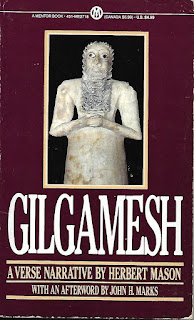Mystery Lover...but overall a very eclectic reader. Will read everything from the classics to historical fiction. Biography to essays. Not into horror or much into YA. If you would like me to review a book, then please see my stated review policy BEFORE emailing me. Please Note: This is a book blog. It is not a platform for advertising. Please do NOT contact me to ask that I promote your NON-book websites or products. Thank you.
Pages
Monday, October 25, 2010
Gilgamesh
Gilgamesh is one of the most ancient stories extant today. The original tellings of this ancient Sumerian mythic tale are said to date back to the third millennium BC. The story of the great king and his doomed friend was passed along to the Babylonians, who wrote their epic tale on stone tablets. The discovery of the tablets in the 19th century sparked new interest in the ancient story and since then it has proven as strong in mythic character as the stories from ancient Greece and Rome. This translation by Herbert Mason is exceptionally accessible and gives the reader the full flavor of ancient Sumeria without losing us in people and place names unfamiliar to us.
***Caution, contains spoilers. Shouldn't ruin your experience if you want to read this epic, but if you're picky about knowing details before you read--then perhaps you should stop now.***
The story is a simple one--revolving around the themes of love, friendship, and death and man's attempts to accept and understand tragedy. Told in epic form, it gives us a depth of feeling and intensity that is near unrivaled. We have the King, Gilgamesh, who has grown bored with his kingship and thus a little cruel. We have Enkidu, a man of the wild...primitive and closer to the animals than he has been to any other human. Events bring these two together and they form a friendship that is a precursor to all the great friendships of literary history (David & Jonathan, for example). Each brings his own strengths to the relationship, and together they are stronger than either alone. When Gilgamesh decides that he must fight monstrous Humbaba, Enkidu does not want to go on the dangerous journey, but once committed he encourages Gilgamesh when he needs it most. And later Enkidu faces down his own monster with the support of Gilgamesh. The gods, however, are not pleased with loss of two of their monsters and exact a payment from the friends. Enkidu must die and Gilgamesh spends the rest of the story trying to bring his friend back, trying to get others to understand the depths of his grief, and finally finding a way to reconcile himself to his great loss.
Favorite quote:
For being human holds a special grief
Of privacy within the universe
That yearns and waits to be retouched
By someone who can take away
The memory of death.
This is one of the finest and most accessible early classic translations that I have read. Herbert Mason's verse form and style are right on target and made this an easy read. Four and a half stars out of five.
PS: I forgot to mention that this book was my prize from Hotchpot Cafe for finishing my Birth Year Reading Challenge. Thanks for the awesome book!
5 comments:
Sorry folks, but I have been getting an incredible amount of spam. I have adjusted my settings and all messages will be moderated from now on. If that does not take care of the problem then I will have to go to the "Prove You're Not a Robot" thing--which I hate as much as you do.
If your name does not appear automatically, please tell me your name in the comment. Otherwise you will just show up as "Unknown." Thanks!

I've always wanted to read Gilgamesh. I'll have to look for this edition. I'm always grateful for an easy to read copy!
ReplyDeleteI love the Epic Of Gilgamesh! I had to write a paper on it in Ancient Near Easter Studies :)
ReplyDeleteThis seems to be a popular one for the Really Old Classics Challenge - a few people have mentioned wanting to read it.
ReplyDeleteI just added your review to this month's recap.
I just re-read this one (review here), and as always, the story offers something new. I have never read the poetic form - the one I own is written in prose - so that might be my next read.
ReplyDeleteSo glad you enjoyed the book (and the challenge!). I'm always thrilled to find that the classics still speak across the ages. A great book never gets old!
ReplyDelete